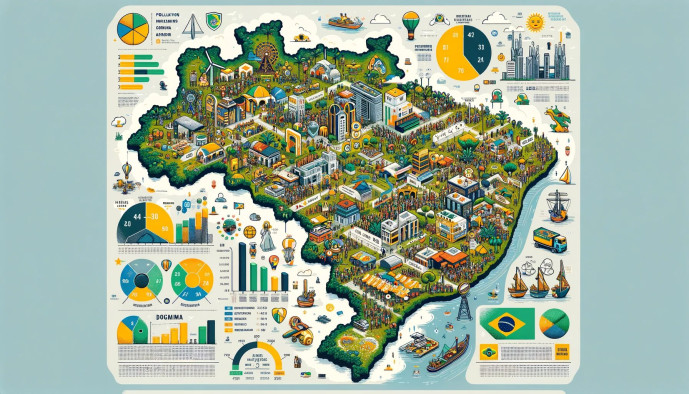Key Facts of Brazil: Demogragphy, Population, Economy, Politics, etc…
Explore Brazil's vibrant populace, dynamic economy, and political landscape.

At a Glance: Brazil’s Core Identity
Official Name & Capital
- Official Name: Federative Republic of Brazil (República Federativa do Brasil)
- Capital City: Brasília. While Brasília serves as the nation’s political capital, the vibrant cities of Rio de Janeiro and São Paulo are Brazil’s most renowned cultural and economic hubs.
Geography & Size
Brazil is a country of continental proportions, covering nearly half of the South American landmass.
Its vast territory is slightly smaller than the United States.
It shares a border with nearly every country on the continent, with the exceptions of Chile and Ecuador.
Time Zones
Reflecting its immense size, Brazil spans four standard time zones.
Most key destinations for travelers, including Rio de Janeiro, São Paulo, and Salvador, operate on Brasília Time (BRT), which is UTC-3. The Amazonian city of Manaus is on Amazon Time (AMT), which is UTC-4.
People & Society
Population
Brazil is home to over 215 million people (as of 2023), making it the most populous country in South America.
The country is highly urbanized, with a majority of its population residing in cities, particularly in the sprawling metropolitan areas along the Atlantic coast.
Demographics & Ethnic Makeup
Brazilian culture is a rich tapestry woven from the threads of diverse ancestries, including European, African, Indigenous, and Asian heritage. This blend is evident in the nation’s music, cuisine, and traditions.
To illustrate this complexity, Brazilians often self-identify within several main groups, including White, Pardo (mixed-race), Black, Asian, and Indigenous.
Language
The official language is Portuguese. It is essential for travelers to know that Spanish is not spoken here. Brazilian Portuguese has a unique, melodic accent and its own set of vocabulary that distinguishes it from the Portuguese spoken in Europe.
Outside of major hotels and tourist-centric businesses in large cities, English is not widely spoken. We highly recommend learning a few basic Portuguese phrases; the effort is always warmly appreciated.
Religion
While Brazil has no official state religion, Roman Catholicism remains the predominant faith for a majority of the population.
The religious landscape is dynamic, marked by the significant growth of Evangelical Protestantism. Furthermore, Afro-Brazilian religions like Candomblé and Umbanda hold deep cultural importance, particularly in states like Bahia.
Government & Politics
Political System
Brazil is a Federal Presidential Republic, with a political structure that shares similarities with that of the United States.
The nation is composed of 26 states and one Federal District, where the capital, Brasília, is located.
Current Leadership
The President, currently Luiz Inácio Lula da Silva, serves as both the head of state and the head of government.
General Stability
From a traveler’s perspective, the country is stable. However, political demonstrations can occur in major cities. These are typically peaceful and localized, but it is always wise for visitors to avoid these gatherings and stay informed of local conditions.
Economy
Economic Overview
Brazil boasts the largest economy in Latin America and is recognized as a major market on the global stage.
It is a prominent emerging economy and a key member of international economic blocs such as Mercosur and BRICS.
Currency
The official currency is the Brazilian Real (the plural form is reais).
The international currency code is BRL, and the symbol you will see locally is R$.
Key Industries
Brazil’s diverse and powerful economy is driven by several key sectors, giving travelers a glimpse into the country’s vast natural and industrial resources.
- Agriculture: A global leader in the production of coffee, soybeans, sugar, and beef.
- Mining: A major exporter of iron ore and other valuable minerals.
- Manufacturing: A robust sector producing automobiles, aircraft, and consumer goods.
- Energy: Significant production of oil and a world leader in hydroelectric power.
- Services: A large and growing service sector, which includes a vibrant tourism industry.